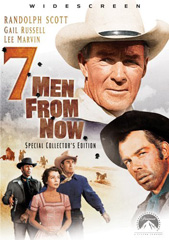An Unknown Now, He Made Westerns Of Spiritual Depth
The villains are always more affable than the Scott hero. More needy, too. They want something: money, yes, and maybe to arouse a response in the woman who's part of the expedition. A droll Burt Kennedy specialty, deliciously road-tested by Lee Marvin in "Seven Men From Now," has the badman pitching woo at the lady (the lamp-eyed Gail Russell) in front of Scott (and her weak husband, Walter Reed) by genially pretending to discuss another woman he met once upon a time.
The film basically works because of Lee Marvin. Anybody could've played the other parts, but not his. As an Epinions review put it:
Chiricahua Apaches get two mentions and appear twice. First, Stride tells two of the outlaws that the Apaches stole his horse...to eat it. Later he tells a soldier hunting the Apaches that the Indians are half-starved.
A band of six Apaches confronts the Anglos, who give them a spare horse to mollify them. Soon they're back in pursuit of a stranger on foot. Outnumbered something like 8-2, Stride and Masters kill a few of them and chase off the rest.
In their brief appearance, the Apaches look authentic. Stride says there's only 50 of them left, which explains their desperation. And the California high desert effectively substitutes for the Arizona low desert. (The Epinions reviewer said Lone Pine didn't look like the Chiricahua stronghold to him, but the resemblance is a lot closer than Monument Valley's resemblance to the Great Plains.)
So the Indians aren't bloodthirsty savages, but they also aren't individuals with thoughts and feelings. They're an intermediate stage: the faceless menace. The portrayal could be better, but it could be worse. By referring to their hunger, Stride at least gives them a hint of humanity.
A masterpiece?
Is Seven Men from Now a "B-movie that turned out to be a masterpiece," as the New York Times put it? I'd say it's a masterpiece of a B-movie, but it can't quite compete with A-list Westerns such as High Noon and Shane. (It can compete with such overrated John Ford Westerns as The Searchers and She Wore a Yellow Ribbon.)
I didn't buy the central premise: that Ben Stride and Bill Masters are real men but John Greer isn't. Although everyone thinks he's spineless, including his wife, he doesn't act weak or cowardly. His main "fault" is not glaring or snarling or sauntering like the others. He talks too cheerfully like the salesman he is.
Because of this, Annie Greer starts sidling up to Stride? Yeah, right. This battle of the he-men may have impressed 1950s audiences, but it doesn't impress me. John Greer should've told his rivals to get lost...and if he didn't, his wife should've.
Rob's rating: 7.5 of 10.


No comments:
Post a Comment